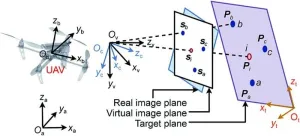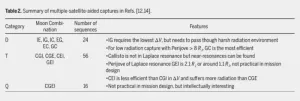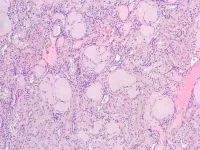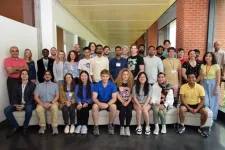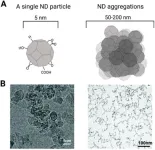(Press-News.org) An estimated 1 in 4 older Americans with dementia or mild cognitive impairment lives alone and is at risk of practices like unsafe driving, wandering outside the home, mixing up medications and failing to attend medical appointments.
In a study publishing in JAMA Network Open on Aug. 18, 2023, researchers led by UC San Francisco concluded that the United States health system is poorly equipped to serve patients living solo with cognitive decline, a group whose numbers are predicted to swell as the population ages.
For these patients, living alone is a social determinant of health with an impact as profound as poverty, racism and low education, said first author Elena Portacolone, PhD, MBA, MPH, of the UCSF Institute for Health and Aging and the Philip R. Lee Institute for Health Policy Studies.
In this qualitative study, researchers interviewed 76 health care providers, including physicians, nurses, social workers, case workers, home care aides and others. Participants worked in memory clinics, home care services and social services and other places in California, Michigan and Texas
The providers raised concerns about patients missing medical appointments, failing to respond to follow-up phone calls from the doctor’s office and forgetting why appointments were made, leaving them vulnerable to falling off the radar. “We don’t necessarily have the staff to really try to reach out to them,” said a physician in one interview.
Discharging a patient is like ‘sending a kid out to play on freeway’
Some patients could not assist their doctor with missing information on their chart, leaving the providers uncertain about the pace of their patient’s decline. Many had no names listed as emergency contacts, “not a family member, not even a friend to rely on in case of a crisis,” according to a case manager.
These patients were at risk for untreated medical conditions, self-neglect, malnutrition and falls, according to the providers. A house service coordinator also noted that calls to Adult Protective Services were sometimes dismissed until a patient’s situation became very serious.
One consequence of the shaky infrastructure supporting these patients was that they were not identified until they were sent to a hospital following a crisis, like a fall or reaction to medication mismanagement. Some were discharged without a support system in place. In one case, a patient was sent home with a taxi voucher, a situation that a psychiatrist likened to “sending a kid out to play on the freeway.”
These findings are an indictment of our health care system, which fails to provide subsidized home care aides for all but the lowest-income patients, said Portacolone.
“In the United States, an estimated 79% of people with cognitive decline have an income that is not low enough to make them eligible for Medicaid subsidized home care aides in long-term care,” she said, adding that the threshold for a person living alone in California is $20,121 per year.
While Medicare is available to adults over 65, subsidized aides are generally only provided after acute episodes, like hospitalizations, for fixed hours and for limited durations, she said.
“Most patients need to pay out-of-pocket and since cognitive impairment can last for decades, it is unsustainable for most people. Aides that are available via Medicaid are very poorly paid and usually receive limited training in caring for older adults with cognitive impairment,” she added.
Subsidized home care aides plentiful in Europe, Japan, Canada
In contrast, subsidized home care aides are generally available to a significantly larger percentage of their counterparts living in parts of Europe, Japan and Canada, said Portacolone, citing a 2021 review of 13 countries, of which she was the senior author.
The study’s findings illustrate substantial deficiencies in how our health system provides for people with dementia, said senior author Kenneth E. Covinsky, MD, MPH, of the UCSF Division of Geriatrics. “In an era when Medicare is going to spend millions of dollars for newly approved drugs with very marginal benefits, we need to remember that Medicare and other payers refuse to pay far less money to provide necessary supports for vulnerable people with dementia.”
The researchers advocate for a system in which robust supports are made available by funding from an expanded Medicare and Medicaid. This will become increasingly critical, said Portacolone, “because effective treatments to reverse the course of cognitive impairment are unavailable, childlessness and divorce are common, and older adults are projected to live longer and often alone.”
Co-Authors: Barbara J. Bowers, PhD, RN, of University of Wisconsin, Madison; Robyn I. Stone, DrPH, of LeadingAge, of Washington, D.C.; and Tung T. Nguyen, MD, Jacqueline M. Torres, PhD, Julene K. Johnson, PhD, Ashwin A. Kotwal, MD, Sahru Keiser, MPH, Thi Tran and Yulin Yang, PhD, Elizabeth Rivera, PhD, Paula Martinez, MPP, all of UCSF.
Funding: National Institute on Aging (RO1 AG069147)
Disclosures: Please see the paper.
About UCSF: The University of California, San Francisco (UCSF) is exclusively focused on the health sciences and is dedicated to promoting health worldwide through advanced biomedical research, graduate-level education in the life sciences and health professions, and excellence in patient care. UCSF Health, which serves as UCSF's primary academic medical center, includes top-ranked specialty hospitals and other clinical programs, and has affiliations throughout the Bay Area. UCSF School of Medicine also has a regional campus in Fresno. Learn more at https://ucsf.edu, or see our Fact Sheet.
###
Follow UCSF
ucsf.edu | Facebook.com/ucsf | YouTube.com/ucsf
END
Caution: Living alone puts people with cognitive decline at risk
Patients forget appointments, mix up medications and have no one to contact in an emergency.
2023-08-18
ELSE PRESS RELEASES FROM THIS DATE:
Cutting-edge UAV technology: New method for dynamic target tracking in GPS-denied environments
2023-08-18
A study published in Engineering introduces a novel image-based visual servoing (IBVS) method for unmanned aerial vehicles (UAVs) to track dynamic targets in GPS-denied environments. Titled "Dynamic Target Tracking of Unmanned Aerial Vehicles Under Unpredictable Disturbances," the research article presents a comprehensive approach that addresses the challenges of estimating target velocities, image depth estimation, and tracking stability in the presence of external disturbances.
The proposed method utilizes a constructed virtual camera to derive simplified and decoupled image dynamics for underactuated UAVs. By considering ...
Scientists reviewed the trajectory design and optimization for Jovian system exploration
2023-08-18
The Jovian system has greatly attracted the interest of human exploration because of the important scientific value. However, Jupiter and its 4 Galilean moons form a unique and complex multi-body dynamical environment that greatly challenges trajectory design and optimization. Moreover, the extremely strong radiation environment of Jupiter and the low available fuel of spacecraft further increase the difficulty of trajectory design. In order to satisfy the requirements of diverse missions of the Jovian system exploration, develop new mission concepts, and obtain higher merit with lower cost, a variety of theories and methodologies of ...
Japanese squirrels develop human hereditary diseases with aging
2023-08-18
A research group led by Dr. Tomoaki Murakami from the Tokyo University of Agriculture and Technology has revealed that fibrinogen Aα-chain amyloidosis, a previously unreported disease in animals other than humans, is highly prevalent in Japanese squirrels (Sciurus lis). In this study, they compared the pathology with that of humans, and suggested the importance of Japanese squirrels in the comparative pathological analysis of fibrinogen Aα-chain amyloidosis.
The researchers published their results on August 8th in the Journal of Pathology.
Amyloidosis is a disease group in which amyloid, generated by misfolding ...
Immunotherapy: Antibody kit to fight tumors
2023-08-18
A new study highlights the potential of artificial DNA structures that, when fitted with antibodies, instruct the immune system to specifically target cancerous cells.
Immunotherapy is viewed as an exceptionally promising weapon in the fight against cancer. In essence, the aim is to activate the body’s immune system in such a way that it identifies and destroys malignant cells. However, the destruction must be as effective and specific as possible, to avoid damaging healthy cells. A team of researchers from LMU, the Technical University of Munich (TUM) and Helmholtz Munich have now published a new study in Nature Nanotechnology in which they present ...
Auburn University hosts the 60th edition of the Renowned Computational Biophysics Workshop
2023-08-18
AUBURN, AL – In July, as many enjoyed the hot weather at Alabama's gulf coast beaches, in the Leach Science Center, Auburn University's Department of Physics hosted an engaging scientific event. For the first time since 2016, the southern USA was home to the “Hands-On Workshop on Computational Biophysics” with Auburn University, for the first time, as its esteemed host.
Under the guidance of Prof. Rafael Bernardi from Auburn University's Department of Physics and Prof. Emad Tajkhorshid of the Beckman Institute at the University of Illinois at Urbana-Champaign, the workshop showcased expertise from ...
Reviewing MAFLD opens new treatment pathways
2023-08-18
Non-alcoholic fatty liver disease (NAFLD) is a common condition that affects up to 30% of adults in the general population. It is characterized by the accumulation of fat in the liver. It is often associated with other conditions, such as obesity, type 2 diabetes, and metabolic syndrome. The new definition of metabolic dysfunction-associated fatty liver disease (MAFLD) was proposed in 2020. MAFLD is diagnosed based on hepatic steatosis (fatty liver) and at least one of three metabolic risk abnormalities: overweight/obesity, type 2 diabetes, or evidence of metabolic dysregulation.
A recent meta-analysis led by Ming-Hua Zheng from the First Affiliated Hospital ...
Looking at the latest in Life Sciences Discovery and Technology
2023-08-18
Oak Brook, IL – The August 2023 issue of SLAS Technology, the open access journal emphasizing scientific and technical advances across the life sciences, is now available. Volume 28, Issue 4, contains a review from the literature and eight full-length articles covering nanodiamonds, automated buffer exchange, epidermal growth factor (EGF) and other laboratory automation-related research.
From the Literature
Life sciences discovery and technology highlights
The authors examine several areas of research within the literature to highlight significant developments ...
A simple mouth rinse could spot early heart disease risk
2023-08-18
What if we could identify the earliest warning signs of cardiovascular disease from a simple saliva sample? Scientists think they have found a way to do so. Gum inflammation leads to periodontitis, which is linked with cardiovascular disease. The team used a simple oral rinse to see if levels of white blood cells — an indicator of gum inflammation — in the saliva of healthy adults could be linked to warning signs for cardiovascular disease. They found that high levels correlated with compromised flow-mediated dilation, an early indicator of poor arterial health.
“Even in young healthy adults, low levels of oral inflammatory load may have an impact on cardiovascular ...
Texas A&M study finds secondhand smoke may be source of lead exposure in children
2023-08-18
Lead exposure has long been a known health risk, especially for young children. Research has found that even at low levels, chronic exposure to lead can cause damage to the brain and other organs and cause problems with cognitive and motor skills. In response, public health officials have determined that there is no safe exposure level and have made great efforts to eliminate lead-based paint and lead pipes in homes and phase out the use of leaded gasoline.
But another possible source of lead exposure in children has been largely overlooked: secondhand ...
Researchers to explore 3D printing medication tailored to pediatric patients
2023-08-18
Researchers at Texas A&M University will spearhead a groundbreaking project to revolutionize medication administration for pediatric patients, thanks to an approximately $3 million grant from the National Institutes of Health (NIH).
This pioneering initiative explores using additive manufacturing, or 3D printing, to create customized tablets tailored to the unique needs of young children. The project is an interdisciplinary collaboration of experts from the College of Engineering, the College of Pharmacy and the School of Veterinary Medicine and Biomedical Sciences.
Traditional manufacturing methods yield mass-produced medicinal tablets ...
LAST 30 PRESS RELEASES:
A genetic brake that forms our muscles
CHEST announces first class of certified critical care advanced practice providers awarded CCAPP Designation
Jeonbuk National University researchers develop an innovative prussian-blue based electrode for effective and efficient cesium removal
Self-organization of cell-sized chiral rotating actin rings driven by a chiral myosin
Report: US history polarizes generations, but has potential to unite
Tiny bubbles, big breakthrough: Cracking cancer’s “fortress”
A biological material that becomes stronger when wet could replace plastics
Glacial feast: Seals caught closer to glaciers had fuller stomachs
Get the picture? High-tech, low-cost lens focuses on global consumer markets
Antimicrobial resistance in foodborne bacteria remains a public health concern in Europe
Safer batteries for storing energy at massive scale
How can you rescue a “kidnapped” robot? A new AI system helps the robot regain its sense of location in dynamic, ever-changing environments
Brainwaves of mothers and children synchronize when playing together – even in an acquired language
A holiday to better recovery
Cal Poly’s fifth Climate Solutions Now conference to take place Feb. 23-27
Mask-wearing during COVID-19 linked to reduced air pollution–triggered heart attack risk in Japan
Achieving cross-coupling reactions of fatty amide reduction radicals via iridium-photorelay catalysis and other strategies
Shorter may be sweeter: Study finds 15-second health ads can curb junk food cravings
Family relationships identified in Stone Age graves on Gotland
Effectiveness of exercise to ease osteoarthritis symptoms likely minimal and transient
Cost of copper must rise double to meet basic copper needs
A gel for wounds that won’t heal
Iron, carbon, and the art of toxic cleanup
Organic soil amendments work together to help sandy soils hold water longer, study finds
Hidden carbon in mangrove soils may play a larger role in climate regulation than previously thought
Weight-loss wonder pills prompt scrutiny of key ingredient
Nonprofit leader Diane Dodge to receive 2026 Penn Nursing Renfield Foundation Award for Global Women’s Health
Maternal smoking during pregnancy may be linked to higher blood pressure in children, NIH study finds
New Lund model aims to shorten the path to life-saving cell and gene therapies
Researchers create ultra-stretchable, liquid-repellent materials via laser ablation
[Press-News.org] Caution: Living alone puts people with cognitive decline at riskPatients forget appointments, mix up medications and have no one to contact in an emergency.
